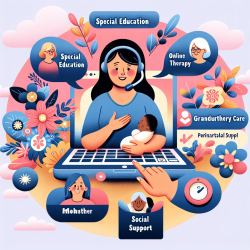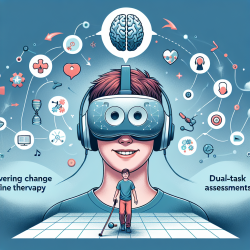Introduction
In the realm of education, the intersection of language and literacy is a pivotal area where speech-language pathologists (SLPs) can make a significant impact. The Elizabeth Usher Memorial Lecture, "Language is literacy is language - Positioning speech-language pathology in education policy, practice, paradigms and polemics," underscores the intrinsic link between oral language competence and literacy. This blog explores how SLPs can harness the insights from this research to enhance their practice and foster better outcomes for children.
The Linguistic Basis of Literacy
The research highlights that oral language competence is foundational to literacy development. This relationship is crucial, as early literacy success is a strong predictor of later academic achievement and psychosocial well-being. SLPs are uniquely positioned to support this transition by integrating evidence-based practices into their work with children.
Bridging the Knowledge Gap
One of the challenges identified in the research is the knowledge gap between SLPs and teachers regarding linguistic concepts crucial for reading instruction. SLPs can play a vital role in bridging this gap by collaborating with educators to ensure that evidence-based approaches are implemented in classrooms. This collaboration can lead to more effective reading instruction and improved literacy outcomes for students.
Response to Intervention (RTI) Framework
The research advocates for the use of a Response to Intervention (RTI) framework to address academic and behavioral challenges. This model allows SLPs to focus their efforts on different levels of intervention, ensuring that their expertise is utilized effectively across universal, targeted, and specialist levels. By doing so, SLPs can help maximize the benefits of their contributions in educational settings.
Advocating for Evidence-Based Practices
SLPs must be well-versed in the political and ideological factors influencing reading instruction. By understanding these dynamics, SLPs can advocate for evidence-based practices in education, countering anti-science thinking and ensuring that their interventions are grounded in empirical evidence. This advocacy is crucial for bridging the health-education gap and achieving improved reading outcomes for all children.
Conclusion
SLPs have a critical role to play in the intersection of language and literacy. By implementing the insights from the Elizabeth Usher Memorial Lecture, SLPs can enhance their practice, foster collaboration with educators, and advocate for evidence-based approaches. These efforts will contribute to better educational outcomes and lifelong success for children.
To read the original research paper, please follow this link: Elizabeth Usher Memorial Lecture: Language is literacy is language - Positioning speech-language pathology in education policy, practice, paradigms and polemics.










